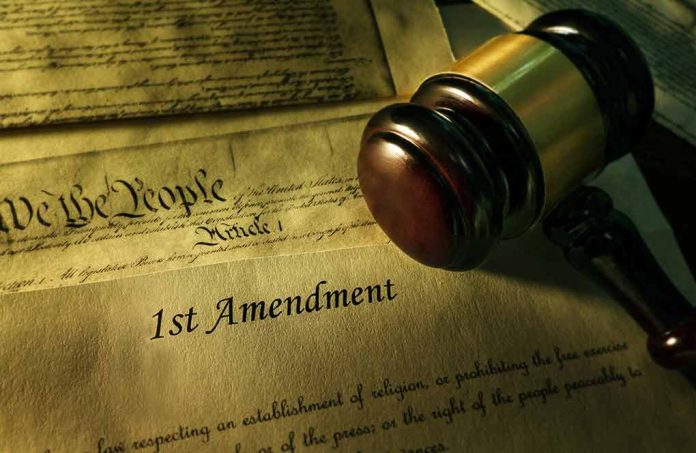
Secretary of State Marco Rubio has banned foreign officials who censor Americans from entering the United States, dealing a crushing blow to global censorship efforts aimed at silencing American voices.
Key Takeaways
- The US will now deny visas to foreign officials who attempt to censor Americans’ social media posts or block content on US-based platforms.
- Rubio specifically targeted officials who issue arrest warrants for US citizens over social media posts made on American soil.
- The policy is part of Trump’s broader commitment to defend American constitutional rights against foreign interference.
- Foreign officials who demand that American tech platforms adopt global content moderation policies will face visa restrictions.
- Visa restrictions extend to family members of officials engaged in censorship activities targeting Americans.
America’s Free Speech Shield Against Foreign Censors
In a decisive move protecting American constitutional rights, Secretary of State Marco Rubio has implemented new visa restrictions targeting foreign officials who attempt to censor Americans. The policy specifically prohibits entry to those who interfere with US citizens’ social media engagement or free expression. This restriction represents a clear demonstration of the Trump administration’s commitment to defending First Amendment rights against global pressure to conform to foreign speech standards, particularly from countries with more restrictive approaches to online content.
“It is unacceptable for foreign officials to issue or threaten arrest warrants on US citizens or US residents for social media posts on American platforms while physically present on US soil,” said Marco Rubio, Secretary of State.
For too long, Americans have been fined, harassed, and even charged by foreign authorities for exercising their free speech rights.
Today, I am announcing a new visa restriction policy that will apply to foreign officials and persons who are complicit in censoring Americans.…
— Secretary Marco Rubio (@SecRubio) May 28, 2025
Legal Framework and Implementation Details
The policy is firmly grounded in Section 212(a)(3)(C) of the Immigration and Nationality Act, which grants the Secretary of State authority to deny entry to individuals whose presence could have adverse foreign policy consequences. The restrictions extend beyond just the officials directly involved in censorship activities to include certain family members as well. This comprehensive approach aims to create a significant deterrent effect, ensuring that foreign governments think twice before attempting to silence American voices or pressuring US-based platforms to conform to their censorship standards.
“It is similarly unacceptable for foreign officials to demand that American tech platforms adopt global content moderation policies or engage in censorship activity that reaches beyond their authority and into the United States,” said Marco Rubio, Secretary of State.
The visa restrictions target officials from various countries who have attempted to regulate or censor American speech. Notable examples include Brazil, where Supreme Court Judge Alexandre de Moraes has taken actions against Elon Musk’s platform X, allegedly to combat disinformation. Germany and Britain have also been criticized by the Trump administration for their restrictions on certain types of speech online, particularly those involving their hate speech laws that often conflict with America’s broader understanding of protected expression.
Countering Global Censorship Efforts
This policy represents a stark contrast to the previous administration’s approach, which many conservatives criticized for working with tech platforms to suppress certain viewpoints under the guise of fighting “disinformation.” Rubio’s action signals America’s renewed commitment to protecting speech rights not just domestically but for all Americans engaging globally. The policy specifically addresses attempts by foreign governments to influence content moderation on US-based platforms like X, Facebook, and YouTube, preventing these officials from traveling to the United States if they attempt to extend their censorship reach.
“What this reveals is that the global liberal project is not enabling the flourishing of democracy,” said Samuel Samson, a State Department official.
As part of the broader policy implementation, Rubio has also suspended visa appointments for students until new guidelines on social media screening are established. This comes after the administration revoked thousands of visas, primarily from students protesting against Israel’s actions in Gaza, demonstrating a consistent application of the principle that visa privileges come with expectations regarding respect for American values and institutions. The move reinforces President Trump’s America First agenda by prioritizing the protection of US citizens’ constitutional rights above the convenience of foreign visitors.
Defending Digital Sovereignty
The visa restriction policy comes at a critical time when social media regulation has become a flashpoint in international relations. Following President Trump’s own experience with platform censorship after the 2020 election, the administration has taken a firm stance against allowing foreign interference with American digital expression. By implementing these restrictions, the State Department has created real consequences for officials who attempt to extend their regulatory reach into American digital territory, effectively drawing a line in the sand regarding America’s digital sovereignty.
With the announcement of US Visa restrictions against those who interfere with free speech rights, there seems to be grounds to place restrictions against Australia'a @eSafetyOffice (E-Karen) and other associated individuals for trying to impose restrictions on American platforms… https://t.co/vkBGjVh4qX
— Rukshan Fernando (@therealrukshan) May 28, 2025
Rubio’s policy addresses a growing trend among foreign governments to demand global compliance with their local content standards. Countries like Brazil have blocked platforms such as X and Rumble for refusing to comply with local content removal demands, while European nations increasingly implement strict regulations through mechanisms like the Digital Services Act. The visa restrictions create a meaningful disincentive for foreign officials considering actions that would affect American users or platforms, establishing a clear boundary that protects American constitutional rights from foreign encroachment.




